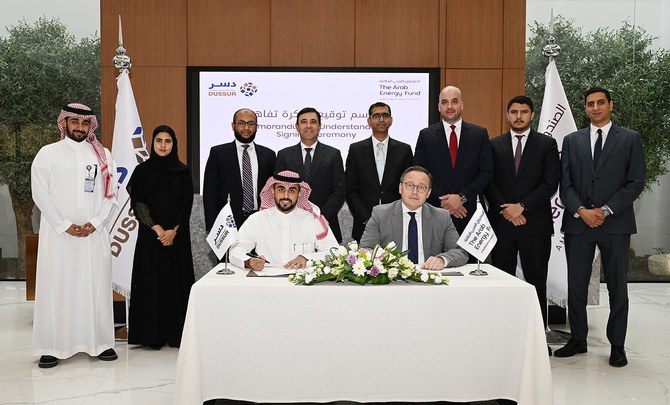RIYADH: Aviation leaders and key figures from across the globe will convene in Riyadh for the Future Aviation Forum 2024, a three-day event highlighting the strides in global air travel innovation, coinciding with Saudi Arabia’s ambition to generate $100 billion from the sector by 2030.
The event, centered on the theme “Elevating Global Connectivity,” will unite more than 5,000 experts and leaders in aviation from over 100 countries, including ministers, regulators, and manufacturers, as well as representatives from airlines and airports.
Led by the General Authority of Civil Aviation, the event is set to take place from May 20 to 22 and will highlight various projects and incentives aimed at attracting investments into Saudi Arabia’s rapidly growing aerospace sector.
This includes investment projects across areas such as airports, airlines, and ground services, as well as cargo, and logistics, which will be highlighted on the sidelines of the forum’s Investment Showcase.
The $100 billion in opportunities includes more than $50 billion earmarked for airports, around $40 billion for new aircraft orders, and $10 billion allocated to other projects.
Building on the success of the 2022 edition, which witnessed the signing of over 50 agreements and deals totaling $2.7 billion, this year’s forum will showcase commercial announcements alongside roadmap presentations and specialized panel sessions focusing on general aviation.
Minister for Transport and Logistics Services Saleh Al-Jasser will inaugurate FAF24 and said: “Saudi Arabia is offering unparalleled aviation investment opportunities globally. The Saudi Aviation Strategy aims to triple passenger numbers, connect to over 250 destinations, and manage 330 million passengers and 4.5 million tonnes of cargo by 2030.”
The Investment Showcase at the forum will be inaugurated by the Minister of Investment Khaled Al-Falih.
“Saudi Arabia is the world’s new investment hub, targeting $3.3 trillion in investment by 2030. Aviation is a key investment sector and enabler of the Kingdom’s broader economic transformation,” Al-Falih said, according to a press release.
He added: “The aviation investment showcase will provide investors with unparalleled access to participate in the Kingdom’s transformation.”
The showcase will include investor briefings, meetings, and panels on major projects including the massive six-runway King Salman International Airport in Riyadh and public-private partnerships for the Abha, Taif, Hail and Qassim international airports.
It will also feature opportunities in cargo and logistics, advanced air mobility, and business aviation. Aviation suppliers will be briefed on expansion plans for the new airline Riyadh Air, as well as leading regional airlines including Saudia, Flynas, and Flyadeal.
The main sponsors of the forum include Saudia Group, Matarat, King Salman International Airport, and Saudi Air Navigation Services.
Global aviation executives from companies including Boeing, Airbus, Commercial Aircraft Corp. of China, and Embraer will also attend the event.
Additionally, GACA is set to unveil a General Aviation roadmap setting how to increase the sector’s contribution to Saudi Arabia’s gross domestic product tenfold to $2 billion by 2030.
The plan covers the business jet segment, including charter, private, and corporate aircraft, and will support Saudi Arabia’s development as a global high-value business and tourist destination.
The new roadmap comes after Saudi Arabia revised its 2030 tourism target upwards from 100 to 150 million visitors in October 2023.
“The General Aviation roadmap will turbocharge the sector within the Kingdom, transforming infrastructure and regulations, simultaneously developing, promoting, and enhancing general aviation services in the market,” said Abdulaziz-Al Duailej, president of GACA.
He added: “GACA looks forward to hosting general aviation investors, operators, and service providers at the Future Aviation Forum in May, where we will launch this ambitious plan to global audiences.”
The roadmap is designed to bolster private aviation by facilitating infrastructure investments and streamlining regulations for aircraft owners, lessors, investors, operators, and service providers.
This initiative comes after GACA’s decision to eliminate ‘empty-leg restrictions’ and simplify economic license requirements for operators and investors in October 2023, aimed at enhancing the general aviation sector.
The event will also cover industry themes including business, talent and the future, collaborations, and ecosystems, as well as sustainability, innovation, and technology.
High-level speakers such as Fadi Al-Buhairan, CEO of Special Integrated Logistics Zone, Gaith Al-Gaith, CEO of FlyDubai, and Mohammed Al-Maghlouth, CEO of Matarat Holding, are set to participate in the forum.
Suliman Al-Mazroua, CEO of the National Industrial Development and Logistics Program, Bander Al-Mohanna, managing director and CEO of Flynas, and Fahd Cynndy, CEO of Saudia Technic are also due to take part.
Following the opening remarks on the first day, the panel titled “Ministerial Speech: Sky High Tourism – Unlocking Destinations and Cultural Exchange Now and in the Future” will take place, followed by a special conversation with Boeing and a spotlight session on the New Future of Aviation.
The event will then highlight the future of airports and logistics with the plenary sessions “Airports Council International Special Address: Airports of the Future” and “Insight Piece: Navigating Tomorrow – Customer Focus, Digitalization, and AI as Enablers for the Future.”
The first day will also address securing the future of human capital in aviation with the sessions “Cargo and Logistics Town Hall: An Era of Growth, Evolution, and Opportunity” and “Aviation Human Capital Now and for the Future – Meeting Our Industry’s Most Critical Challenge.”
On the second following the key address, a conversation session with Commercial Aircraft Corp. of China will take place followed by a panel exploring what is the “Future of Sustainability in Aviation and Tourism.”
It will then highlight a panel discussion on “Privatization, Investment and Funding – The Evolving Financial and Infrastructure Landscape,” which will then be followed by a conversation with Embraer.
The second day will spotlight the future of civil aviation with the sessions “Global Civil Aviation Spotlight: Tonga and Nepal,” “Civil Aviation Authority Director General Panel: Aviation – Accelerating from Economic Enabler to Sustainability Champion,” and an insight piece on “How Safe Are Our Skies.”
The third day will feature interactive workshops on assistance for aircraft accident victims and their families.






















